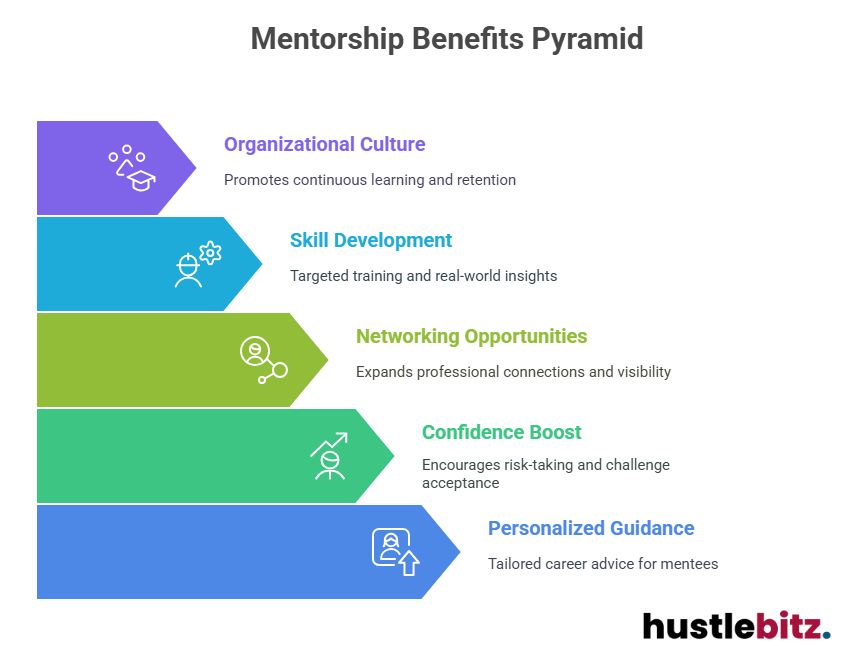Mentorship plays a vital role in career advancement by providing personalized guidance from experienced professionals. It fosters skill development, enhances confidence, and promotes accountability. Effective mentors offer industry insights that help mentees navigate complex environments and set achievable career goals. Additionally, a strong mentorship relationship expands professional networks, increasing visibility and access to opportunities. Such dynamics foster a culture of continuous learning and contribute to overall professional effectiveness. Mentorship not only aids individual growth but also enhances organizational success. To better understand how to leverage mentorship effectively, there are more insights waiting to be explored.
Key Takeaways
- Mentorship provides personalized career guidance, helping mentees navigate complex professional landscapes effectively.
- A strong mentor boosts mentee confidence, encouraging them to take risks and embrace challenges.
- Mentors enhance networking opportunities, expanding professional connections and increasing visibility in the industry.
- Skill development is fostered through targeted training and real-world insights shared by experienced mentors.
- Establishing a mentorship culture within organizations improves employee retention and promotes a continuous learning environment.

Understanding Mentorship
Mentorship serves as a pivotal relationship in professional development, where an experienced individual guides and supports a less experienced mentee in navigating their career path. Understanding the various types of mentorship is essential for both mentors and mentees. These types can include formal mentorship, where structured programs are in place, and informal mentorship, which often arises organically through personal connections.
Different mentorship styles also play a crucial role in shaping the relationship. Some mentors may adopt a directive style, providing specific advice and guidance, while others may favor a more facilitative approach, encouraging mentees to explore solutions independently. The qualities of an effective mentor—such as empathy, communication skills, and commitment—are critical for fostering a productive environment that promotes growth.
However, mentorship is not without its challenges. Mentees may struggle with vulnerability or fear of judgment, while mentors might face time constraints or difficulty in establishing boundaries. Additionally, there are common misconceptions about mentorship, including the belief that mentors should have all the answers or that the relationship is purely transactional.
It is crucial to dispel these myths to foster realistic expectations and a successful mentorship experience. By recognizing the diverse types of mentorship, understanding various mentorship styles, and being aware of potential challenges and misconceptions, individuals can better prepare for and engage in meaningful mentorship relationships that support career advancement.
Benefits of Having a Mentor
The guidance of a mentor can significantly enhance an individual’s professional trajectory by providing tailored advice, networking opportunities, and insights into industry nuances. Mentorship offers various benefits that can facilitate career advancement and foster personal growth. A mentor serves as a vital resource for career guidance, helping mentees navigate complex professional landscapes and make informed decisions.
One of the primary advantages of having a mentor is the confidence boost that comes from receiving validation and support. This encouragement can empower individuals to take risks and embrace challenges, fostering a growth-oriented mindset. Additionally, mentors act as accountability partners, ensuring that mentees remain committed to their goals and professional development.
Moreover, mentors provide invaluable industry insights that can help mentees understand trends, expectations, and best practices. This knowledge can be instrumental in making strategic career moves and enhancing one’s expertise.
| Benefit | Description | Impact |
| Career Guidance | Personalized advice on career paths and decisions | Informed decision-making |
| Confidence Boost | Support and validation that encourages risk-taking | Enhanced self-esteem |
| Accountability Partner | Regular check-ins to ensure progress towards goals | Increased motivation |
Finding the Right Mentor

Identifying the right mentor requires careful consideration of factors such as industry experience, communication style, and alignment of career goals. A mentor’s qualities play a crucial role in effective mentor matching. Look for individuals with a proven track record in your field who possess the relevant knowledge and insights to guide you through your career journey.
Equally important is the mentor’s communication style. A mentor who communicates in a manner that resonates with you can foster a more productive and open relationship. Consider whether you prefer direct feedback or a more nurturing approach. Understanding these nuances can enhance the quality of your interactions and facilitate a more rewarding mentorship experience.
Alignment of personal goals with those of the mentor is another critical aspect. A mentor who shares similar aspirations or has successfully navigated paths that mirror your ambitions can provide invaluable guidance. This shared vision can lead to more meaningful discussions and constructive mentor feedback, ultimately aiding in your professional development.
To ensure a successful match, take the time to evaluate potential mentors against these criteria. Engage in conversations to gauge their fit, and don’t hesitate to ask questions about their experiences and mentoring style.
Building a Mentorship Relationship

Establishing a strong mentorship relationship requires open communication and mutual respect, as these elements form the foundation for productive and meaningful interactions. The first step in building this relationship is establishing trust, which allows both the mentor and mentee to feel comfortable sharing ideas, challenges, and aspirations. Trust can be fostered by being transparent about intentions and demonstrating reliability over time.
Setting expectations at the outset is crucial. Both parties should clearly define their roles, goals, and the frequency of meetings. This clarity ensures that both mentor and mentee are aligned in their objectives and can work towards common goals effectively.
Additionally, maintaining communication is vital for the relationship’s success. Regular check-ins can help address any emerging concerns and keep the dialogue open, allowing for continuous engagement and support.
Measuring progress is another essential aspect of a successful mentorship. By establishing specific milestones, both the mentor and mentee can assess growth and development. This process not only highlights achievements but also identifies areas for improvement.
The Role of Mentorship in Networking

Mentorship frequently serves as a powerful catalyst for expanding professional networks, as mentors often introduce mentees to key industry contacts and valuable opportunities. This relationship not only enhances visibility within a specific field but also fosters the development of essential networking strategies. A mentor’s established connections can provide mentees with access to influential individuals who may otherwise remain beyond reach.
Through mentor connections, mentees can learn how to navigate the complexities of professional relationships. Mentors, drawing from their experiences, can share industry insights that are crucial for effective networking. For instance, a mentor may advise on the best practices for approaching potential contacts, attending industry events, or utilizing social media platforms for professional engagement.
Furthermore, alumni networks can play a significant role in this dynamic. Many mentors are active participants in these networks and can leverage their affiliations to open doors for their mentees. By tapping into these shared backgrounds, mentees can gain access to a wealth of opportunities, including internships, job openings, and collaborative projects that are often circulated within these circles.
Mentorship and Skill Development

The relationship between a mentor and mentee is instrumental in fostering essential skills that are critical for professional growth and advancement.
Mentorship not only facilitates knowledge transfer but also addresses skill gaps that may hinder an individual’s progress toward their career goals. Through personalized guidance, mentors help mentees identify their unique learning styles, enabling tailored approaches to skill development.
Key benefits of mentorship in skill development include:
- Targeted Skill Enhancement: Mentors can pinpoint specific skill gaps and provide focused training to bridge those gaps.
- Practical Knowledge Transfer: Experienced mentors share their insights and experiences, allowing mentees to learn from real-world applications.
- Personal Growth: The mentorship process encourages self-reflection, helping mentees to develop both personally and professionally.
- Networking Opportunities: Mentors often introduce mentees to valuable contacts, enhancing their professional network and potential career pathways.
- Goal Setting and Accountability: Mentors assist in establishing clear career goals while holding mentees accountable for their progress.
In an era where rapid changes in technology and industry standards are commonplace, mentorship becomes vital for continuous development. By fostering an environment of open communication and support, mentors can significantly impact their mentees’ journey toward achieving their career aspirations.
Ultimately, the investment in mentorship not only contributes to the individual’s skill set but also cultivates a culture of learning and growth within organizations.
Final Thoughts
Mentorship is a crucial element in career advancement, offering personalized guidance and fostering skill development in an increasingly complex professional landscape. By providing industry insights, boosting confidence, and expanding networks, effective mentorship relationships can significantly enhance individual growth and contribute to organizational success. Understanding the nuances of mentorship—such as finding the right mentor, building strong relationships, and leveraging networking opportunities—can empower professionals to navigate their career paths more effectively. As industries continue to evolve, investing in mentorship not only benefits the mentees but also fosters a culture of continuous learning and improvement within organizations, ensuring a brighter future for all involved. Embracing mentorship as a strategic career tool can lead to transformative outcomes, making it an essential component of professional development.




